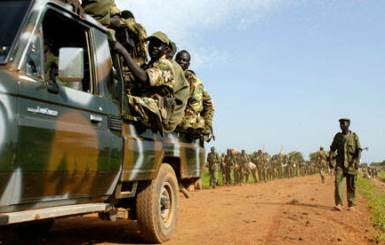Juba downplays defection to SPLM-N of Abyei’s military unit
January 29, 2016 (JUBA) – Senior officials and high ranking military officers of the government of South Sudan have on Friday downplayed the significance of the defection to neighbouring Sudan of forces from the South Sudanese army (SPLA) who are composed of members from the disputed region of Abyei.

The news prompted reactions from senior military and political leaders in South Sudan’s government who accused the sons of Abyei of betraying them despite South Sudan standing behind them for many years.
“They have defected to fight who, what has the people of this country and the leadership not done for them to defect?” asked Lieutenant General James Ajongo Mawut, deputy chief of general staff for operations.
Presidential advisor on decentralization and intergovernmental linkage, Tor Deng Mawien, accused politicians of Ngok Dinka of Abyei in the government of South Sudan of “misleading” their sons in the army to defect to Sudan as a pressure tool to get positions in the government and not for genuine reasons about the neglect of the area.
“This is not the work of the ordinary citizens of Abyei who know how the government and the people of this country, particularly president [Kiir], holds the issue of Abyei dear to his heart and went there by himself. This is the work of the politicians using it as pressure tool to get positions in the government,” said Mawien.
The presidential advisor said the defection of some soldiers would consolidate views critical of the participation of members of Abyei in the government of South Sudan yet the status of the area is not resolved.
Chol Deng Alaak, chief administrator of Abyei area, but who has since resided in Juba after he was appointed by President Salva Kiir on the side of the government of South Sudan, declined to comment on the matter when reached on Friday. Alaak referred the query to army spokesperson claiming it was a military matter.
A military officer identifying himself as Major Ayuel Kiir claimed in an interview on Thursday that he and several other officers including 1,500 soldiers from the area have defected from the SPLA, which is the official army of South Sudan, and have now joined the military command of the SPLA-N under the overall command of Malik Agar.
However, Malik Agar has been fighting for democratic reforms in Sudan and not fighting to secede to join an independent state of South Sudan as is the case of Abyei.
The natives of Abyei area, which has remained a contested area between the two countries despite the international court of arbitration issuing a verdict in 2009 demarcating the area inhabited by members of nine Ngok Dinka chiefdom, have been seeking a return to the South from where it was transferred to Kordofan province in central Sudan in 1905.
Analysts are keen to say the group has a challenge to establish the objective of the cause of defection.
Many politicians are keen to speculate and attribute the cause to recent political differences and subsequent decisions in which president Salva Kiir removed General Pieng Deng Kuol, a son of Abyei, from police position where he served as inspector general of police. Kuol was one of the high ranking officers in the SPLA from Abyei before he was removed from active military service and moved to the police service in 2013.
Other heavyweight politicians from the area, including former cabinet affairs minister, Deng Alor Kuol and Edward Lino Wuor Abyei, crossed political path and fell out with president Kiir and joined different political camps after the ruling Sudan People’s Liberation Movement (SPLM) split in December 2013 when political difference over democratic reforms and structuring of the leadership turned violent.
General Kuol however remained with the government until he was removed from police service early this month. He is seen as a close ally to the chief of general staff of SPLA, Paul Malong Awan, a long time close military and political ally of President Salva Kiir.
Kuol’s closeness to Awan, who is one of the confidants of president Kiir and whose influence is uncontested in the affairs of the country, is seen as a sign he could get another assignment in different capacity soon.
However, politicians from the area and their supporters would prefer participation of Deng Alor in the government than anyone else for he is regarded in the area as the leader of the Dinka Ngok people.
In the government and among supporters of the president, however, the appointment of Alor into key position is viewed as a development that would have a negative impact on the relations between Sudan and South Sudan, especially if he is assigned to the ministry of foreign affairs as he may pay much attention to the issue of his native area of Abyei at the expense of relations between the two countries and with the international community.
(ST)
